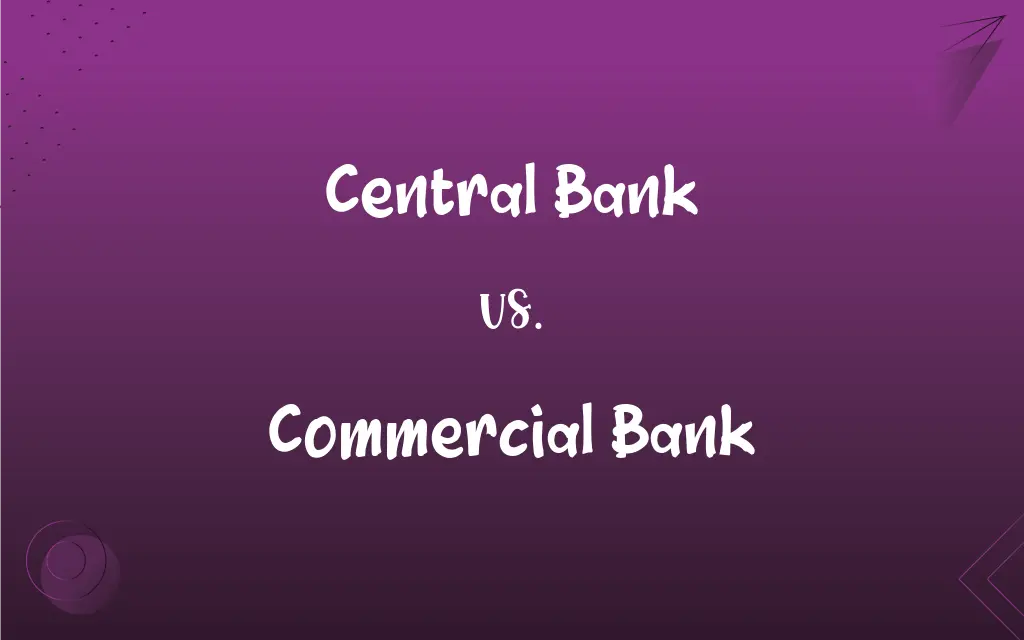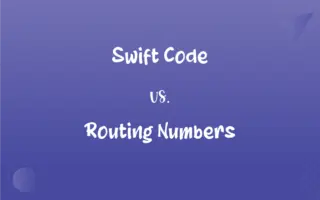Central Bank vs. Commercial Bank: What's the Difference?
By Janet White || Published on December 6, 2023
A central bank is a nation's primary monetary authority, while a commercial bank offers banking services to the public and businesses.

Key Differences
A central bank acts as the primary monetary authority in a country, responsible for monetary policy and stability, issuing currency, and regulating the money supply. In contrast, a commercial bank is a financial institution that offers a range of banking services to individuals and businesses, including deposit accounts, loans, and other financial services.
Central banks are typically government-owned entities or institutions that operate under government mandate, playing a key role in a country's economic policy. Commercial banks, on the other hand, can be privately owned or publicly traded companies focusing on profitability and providing financial services to their customers.
The central bank's services include managing the country's currency, controlling inflation, and acting as a lender of last resort to other banks. While, commercial banks offer services like accepting deposits, granting loans, offering mortgages, and providing wealth management and investment services to the public and businesses.
The central bank also serves as a regulatory body, overseeing the banking system and ensuring financial stability and integrity. Whereas, commercial banks are subject to these regulations, adhering to the guidelines and requirements set by the central bank and other regulatory authorities.
The central bank influences the economy through policies like setting interest rates and reserve requirements for commercial banks. Commercial banks directly impact the economy by providing loans and credit, thereby influencing consumer spending and business investment.
ADVERTISEMENT
Comparison Chart
Primary Function
National monetary policy and regulation
Providing banking services to public/businesses
Ownership
Generally government-owned or mandated
Privately owned or publicly traded
Key Services
Issuing currency, controlling money supply
Accepting deposits, granting loans
Regulatory Role
Regulatory authority for banking system
Regulated by central and other authorities
Economic Impact
Sets monetary policy affecting the economy
Directly impacts consumer/business finance
ADVERTISEMENT
Central Bank and Commercial Bank Definitions
Central Bank
Provides funds to banks in financial distress.
As a lender of last resort, the central bank played a crucial role during the financial meltdown.
Commercial Bank
Accepts deposits and extends loans to individuals and businesses.
Many people rely on their commercial bank for home mortgages and personal loans.
Central Bank
The official authority for issuing and managing the country’s currency.
The central bank introduced new currency notes last year.
Commercial Bank
Provides credit facilities like credit cards and overdrafts.
I got my first credit card from my local commercial bank.
Central Bank
The primary institution responsible for monetary policy and financial stability.
The central bank adjusted interest rates to control inflation.
Commercial Bank
Contributes to economic growth by lending to businesses and consumers.
The commercial bank's loan program helped small businesses grow.
Central Bank
Acts as a bank to other banks, providing financial services to the government and banking sector.
The central bank provided emergency funds to commercial banks during the crisis.
Commercial Bank
Offers banking services to the public and businesses.
The commercial bank opened a new branch downtown to serve more customers.
Central Bank
Regulates and supervises the national banking and financial system.
The central bank implemented new regulations to enhance financial stability.
Commercial Bank
Offers investment and wealth management services.
The commercial bank advised me on my investment portfolio.
FAQs
How do central banks influence the economy?
Through policies like setting interest rates and controlling money supply.
Are commercial banks regulated by central banks?
Yes, they operate under regulations set by the central bank and other financial authorities.
What does a commercial bank do?
Offers banking services like accepting deposits, granting loans, and providing investment services.
What is a central bank?
A nation's primary monetary authority, responsible for monetary policy and financial stability.
How do commercial banks make profits?
Mainly through interest on loans and investments, and fees for services.
What is the role of a central bank in a financial crisis?
Acts as a lender of last resort and implements policies to stabilize the economy.
Can a central bank lend money to the government?
Yes, it can provide financial services to the government.
Do commercial banks create money?
Yes, through lending activities and credit creation.
Is the central bank part of the government?
It's a government-mandated authority but often operates independently.
How does a central bank control inflation?
By adjusting interest rates and controlling the money supply.
Do commercial banks issue currency?
No, that's the role of the central bank.
What kind of loans do commercial banks offer?
Various types, including personal, mortgage, and business loans.
How does a central bank set interest rates?
Based on economic conditions, to control borrowing and spending.
What is the difference in the customer base of central and commercial banks?
Central banks deal with the government and financial institutions, while commercial banks serve the general public and businesses.
Can central banks go bankrupt?
It's highly unlikely due to their role and government backing.
Do commercial banks offer mortgages?
Yes, they are a key provider of mortgage loans.
Can commercial banks invest in securities?
Yes, they engage in various investment activities.
Can individuals open accounts in a central bank?
No, central banks do not offer services to the general public.
Are savings accounts offered by commercial banks?
Yes, they offer a range of deposit accounts including savings accounts.
What is quantitative easing by a central bank?
It's a monetary policy where the central bank buys securities to increase the money supply.
About Author
Written by
Janet WhiteJanet White has been an esteemed writer and blogger for Difference Wiki. Holding a Master's degree in Science and Medical Journalism from the prestigious Boston University, she has consistently demonstrated her expertise and passion for her field. When she's not immersed in her work, Janet relishes her time exercising, delving into a good book, and cherishing moments with friends and family.






































































